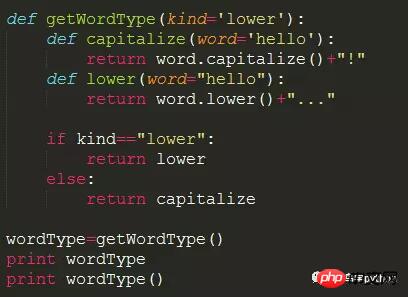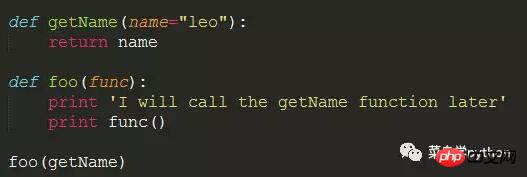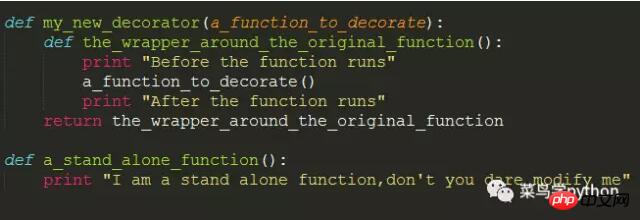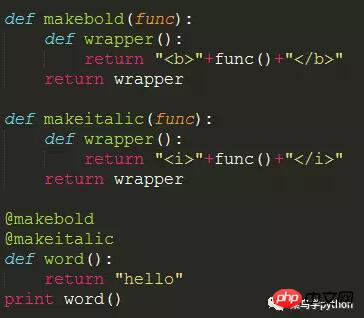Detailed explanation of decorators in Python
I remember when I first learned Python several years ago, when I looked at decorators, I felt that I couldn’t understand the strange words in Jiuyin Manual. Indeed, decorators are a very difficult concept to understand. I believe many beginners must There is also such confusion, so this article mainly introduces relevant information about decorators in Python. Friends in need can refer to it.
This article will lead you to take a closer look at what this decorator is. After reading this article, decorators are no longer difficult.
1. What is a decorator?
Some people on the Internet commented on decorators like this. I think the writing is very interesting and the metaphor is very vivid
The underwear that everyone has is mainly used to cover our shame, but in winter it cannot protect us from wind and cold, what can we do?
One way we thought of was to transform the underwear to make it thicker and longer. In this way, it not only has the function of covering shame, but also provides warmth. However, there is a The problem is, after we transformed this underwear into trousers, although it still has a shame-covering function, it is essentially no longer a real pair of underwear. So smart people invented trousers
and put the trousers directly on the outside of the underwear without affecting the underwear. In this way, the underwear is still underwear. After having trousers, it no longer needs to be worn. It's cold
The decorator is like the trousers we are talking about here. It provides warmth to our bodies without affecting the function of underwear
2. The prequel 4 steps of decorators
Why should I talk about decorators at the end of the introductory chapter? Because this article is too difficult and there are many The prerequisite must be understood. I believe everyone understands Python’s functions, but do you know that functions are also objects and can be passed like parameters? Let’s look at the following example:
1) Functions are also objects
def message(word='hello'): return word.upper()+'!' print message() >> HELLO! my_message=message print my_message >> <function message at 0x000000000288E198> print my_message() >> HELLO!
That is to say, message can be assigned to another variable
2) Functions can be nested and defined inside another function
def show(): print 'Run in show()' def message(word='hello'): return word print message() show() >> Run in show() hello
message It can be nested in the show function. When calling show, the message function will also run.
3) The function returns as a parameter
A function can also be used as The return value of another function, if you don’t believe it, look at the following example

>> <function lower at 0x00000000027DAD68> hello...
4) The function is passed in as a parameter
We first create a getName function, and then pass this function as a parameter to the foo function

>> I will call the getName function later leo
3. The true face of decorators
1). After the previous steps, everyone should understand that functions can be passed in as parameters, can also be returned as parameters, and can also be nested
Decorations In fact, the function is repackaged. It can increase the function of the function without changing the function. It can execute a piece of code before or after the function is executed.

a_stand_alone_function() >> I am a stand alone function,don't you dare modify me a_stand_alone_function_decorated=my_new_decorator(a_stand_alone_function) a_stand_alone_function_decorated() >> Before the function runs I am a stand alone function,don't you dare modify me After the function runs
2). Use a decorator

Look it’s so simple. The decorator has a syntactic sugar @, just @my_new_decorator just put it above A bunch of code is easily resolved. This is Pythonic code, simple and efficient
is actually equivalent to:
another_stand_alone_function=my_new_decorator(another_stand_alone_function)
4. Why use decorators
Decorators provide several advantages related to code maintainability and aesthetics. And as structuring tools, decorators naturally facilitate code encapsulation, which reduces redundancy and makes future maintenance and extension easier.
If you have studied Django and Flask, you will know that a large number of decorators are used in web frameworks to encapsulate code. Let’s look at a simple example below:
We have a theme functionword() outputs a string. We have a function that makes the string bold and another that makes it italic. With decorators, we can combine them very flexibly to extend the functions of the function:

>> <b><i>hello</i></b>
One thing to note is that if the order of the decorators changes, the result will be different. Same.
@makeitalic @makebold def word(): return "hello" print word() >> <i><b>hello</b></i>
That’s it for getting started with decorators. If you don’t understand anything, you can leave a message with me to discuss and communicate. In fact, there are many advanced uses of decorators, such as passing parameters through decorators, class decorators, etc. We will explain them later.
Summarize
The above is the detailed content of Detailed explanation of decorators in Python. For more information, please follow other related articles on the PHP Chinese website!

Hot AI Tools

Undresser.AI Undress
AI-powered app for creating realistic nude photos

AI Clothes Remover
Online AI tool for removing clothes from photos.

Undress AI Tool
Undress images for free

Clothoff.io
AI clothes remover

Video Face Swap
Swap faces in any video effortlessly with our completely free AI face swap tool!

Hot Article

Hot Tools

Notepad++7.3.1
Easy-to-use and free code editor

SublimeText3 Chinese version
Chinese version, very easy to use

Zend Studio 13.0.1
Powerful PHP integrated development environment

Dreamweaver CS6
Visual web development tools

SublimeText3 Mac version
God-level code editing software (SublimeText3)

Hot Topics
 PHP and Python: Different Paradigms Explained
Apr 18, 2025 am 12:26 AM
PHP and Python: Different Paradigms Explained
Apr 18, 2025 am 12:26 AM
PHP is mainly procedural programming, but also supports object-oriented programming (OOP); Python supports a variety of paradigms, including OOP, functional and procedural programming. PHP is suitable for web development, and Python is suitable for a variety of applications such as data analysis and machine learning.
 Choosing Between PHP and Python: A Guide
Apr 18, 2025 am 12:24 AM
Choosing Between PHP and Python: A Guide
Apr 18, 2025 am 12:24 AM
PHP is suitable for web development and rapid prototyping, and Python is suitable for data science and machine learning. 1.PHP is used for dynamic web development, with simple syntax and suitable for rapid development. 2. Python has concise syntax, is suitable for multiple fields, and has a strong library ecosystem.
 Python vs. JavaScript: The Learning Curve and Ease of Use
Apr 16, 2025 am 12:12 AM
Python vs. JavaScript: The Learning Curve and Ease of Use
Apr 16, 2025 am 12:12 AM
Python is more suitable for beginners, with a smooth learning curve and concise syntax; JavaScript is suitable for front-end development, with a steep learning curve and flexible syntax. 1. Python syntax is intuitive and suitable for data science and back-end development. 2. JavaScript is flexible and widely used in front-end and server-side programming.
 Can vs code run in Windows 8
Apr 15, 2025 pm 07:24 PM
Can vs code run in Windows 8
Apr 15, 2025 pm 07:24 PM
VS Code can run on Windows 8, but the experience may not be great. First make sure the system has been updated to the latest patch, then download the VS Code installation package that matches the system architecture and install it as prompted. After installation, be aware that some extensions may be incompatible with Windows 8 and need to look for alternative extensions or use newer Windows systems in a virtual machine. Install the necessary extensions to check whether they work properly. Although VS Code is feasible on Windows 8, it is recommended to upgrade to a newer Windows system for a better development experience and security.
 Can visual studio code be used in python
Apr 15, 2025 pm 08:18 PM
Can visual studio code be used in python
Apr 15, 2025 pm 08:18 PM
VS Code can be used to write Python and provides many features that make it an ideal tool for developing Python applications. It allows users to: install Python extensions to get functions such as code completion, syntax highlighting, and debugging. Use the debugger to track code step by step, find and fix errors. Integrate Git for version control. Use code formatting tools to maintain code consistency. Use the Linting tool to spot potential problems ahead of time.
 PHP and Python: A Deep Dive into Their History
Apr 18, 2025 am 12:25 AM
PHP and Python: A Deep Dive into Their History
Apr 18, 2025 am 12:25 AM
PHP originated in 1994 and was developed by RasmusLerdorf. It was originally used to track website visitors and gradually evolved into a server-side scripting language and was widely used in web development. Python was developed by Guidovan Rossum in the late 1980s and was first released in 1991. It emphasizes code readability and simplicity, and is suitable for scientific computing, data analysis and other fields.
 How to run programs in terminal vscode
Apr 15, 2025 pm 06:42 PM
How to run programs in terminal vscode
Apr 15, 2025 pm 06:42 PM
In VS Code, you can run the program in the terminal through the following steps: Prepare the code and open the integrated terminal to ensure that the code directory is consistent with the terminal working directory. Select the run command according to the programming language (such as Python's python your_file_name.py) to check whether it runs successfully and resolve errors. Use the debugger to improve debugging efficiency.
 Is the vscode extension malicious?
Apr 15, 2025 pm 07:57 PM
Is the vscode extension malicious?
Apr 15, 2025 pm 07:57 PM
VS Code extensions pose malicious risks, such as hiding malicious code, exploiting vulnerabilities, and masturbating as legitimate extensions. Methods to identify malicious extensions include: checking publishers, reading comments, checking code, and installing with caution. Security measures also include: security awareness, good habits, regular updates and antivirus software.






